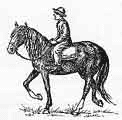
23
Men in our community were active in the operation of the "underground railroad" through Ohio, giving secret sanctuary to runaway slaves and conducting them on their way to Canada, where they would be free. My parents, vigorous in their stand against slavery, gave me a copy of Uncle Tom's Cabin, which was essentially a pamphlet against the Fugitive Slave Law, disguised as a novel. Harriet Beecher Stowe had written it while living in Cincinnati, separated only by the Ohio River from a slave-holding community. As I pored over the pages, I was deeply stirred by the pitiful plight of Uncle Tom and shocked by the horrors of the slave trade.
All over the North public sentiment was growing, and the best intellect of America was on the antislavery side. Kansas territory became a hotbed of controversy when in May 1854 President Franklin Pierce signed a bill opening Kansas and Nebraska for settlement and giving settlers the right to determine the question for themselves.
Abolitionists in the North and slaveholders in the South sought immediately to gain Kansas for their own. Southern sympathizers from Missouri crossed the state line to "spot" claims, while border ruffians attacked free-state settlements founded largely by the New England Emigrant Aid Company. The eminent clergyman, Henry Ward Beecher, pledged his Brooklyn parish to furnish quantities of rifles, which were shipped in boxes labeled "Bibles." During the last six months of 1856, a committee with headquarters in Chicago sent provisions, arms, and clothing valued at $200,000. Little more than half of this24
reached its destination, however, the remainder being destroyed or appropriated by proslavery men at Missouri River landings.
Armed bands tried to stem the tide of emigration from the North by robbing those who disembarked at Kansas City and Leavenworth, and ordering them back home in an insolent manner. James H. Lane, an ardent free-soiler, not to be thwarted by this blockade, mapped out an entrance through Iowa and Nebraska. Those who followed it were known as "Lane's Army of the North."
A free-state settler from Mount Gilead, Ohio, who had taken his wife and children to Kansas, wrote several letters to the editor of the National Era. Those we read with much interest. The following extract, printed in 1854, is typical:"Emigrants are arriving in scores; tents are stretched all over the prairie; cabins are going up in all directions. Labor is plenty. A man, though poor, if he can and will work, can do well here. A man with only a team is independent. But to those who have no means, can't or won't work, Kansas is no place for you. Emigrants must expect to meet some hardships.
"Were I in Ohio today, with my knowledge of Kansas, I should lose no time in coming here. Understand me, I urge no one to come; for, as in all new countries, many chicken-hearted ones will get homesick and leave. But if you have made up your minds and are coming, now is the time. The sooner here, the better for you.Samuel N. Wood."
A newly formed Republican party, made up of Whigs, Free-Soilers, and others favoring the abolition of slavery,
25
had in 1856 nominated John C. Fremont for President and William L. Dayton as his running-mate. Since Father was a Whig and a staunch supporter of Fremont, I heard much about his explorations throughout the West that brought him fame as "the Pathfinder." Abraham Lincoln, a more obscure figure at that time, had recently won acclaim by a strong antislavery speech he delivered in Bloomington, Illinois.
Opposing candidates on the Democratic ticket were James Buchanan and John C. Breckenridge. A banner emblazoned with "Buck and Breck" waved atop a tall hickory pole and was plainly visible from the backyard of my chum, Hamilton Woods. Ham's father, who kept an all-purpose store and harness shop, was also a Whig. The Democratic flag made a tempting target for Ham and me. We took secret delight in shooting it full of holes; no one ever discovered who the "miserable scamps" were that mutilated the banner.
Plans were under way for a large Republican rally at Greenville to which New Harrison was sending a delegation. Father was one of the group and he gave me permission to go. At least a hundred of us were crowded on a heavy log wagon. It was coupled out for twenty-five feet and covered with an open board platform. We could either stand or sit on the floor. Our ride was a bumpy one, for the road was paved with frequent hard clods the size of goose eggs that were ground to powder by the weight of the wagon.
Sixteen strong, well-matched teams had been picked from farms in the vicinity to pull the tremendous load. They were specially groomed and decorated for the occasion, and made an attractive spectacle. John Morrison, our26
capable driver, rode the nigh wheel horse. A single line ran from team to team through a ring in the head band of each bridle until it reached the mouth of the nigh leader. Driving through the streets of Greenville, Morrison often lost sight of his leaders as they rounded a corner far ahead of his position near the wagon.
It was a great rally with speeches and wild demonstrations. Our largest banner bore the party slogan: "Free Soil, Fremont, Free Kansas." The marshal of the day rode a magnificent black-and-white-spotted pony with heavy mane three feet long and a tail touching the ground. The term "pony" is really a misnomer, for this animal was strong enough to carry a well-built man.
When the time came to return home the marshal said to me, "How would you like to ride my pony back to New Harrison while I take your place on the wagon?"
I trotted back and forth from one end of the parade to the other, showing off my borrowed mount. No boy could have been happier than I that day.
